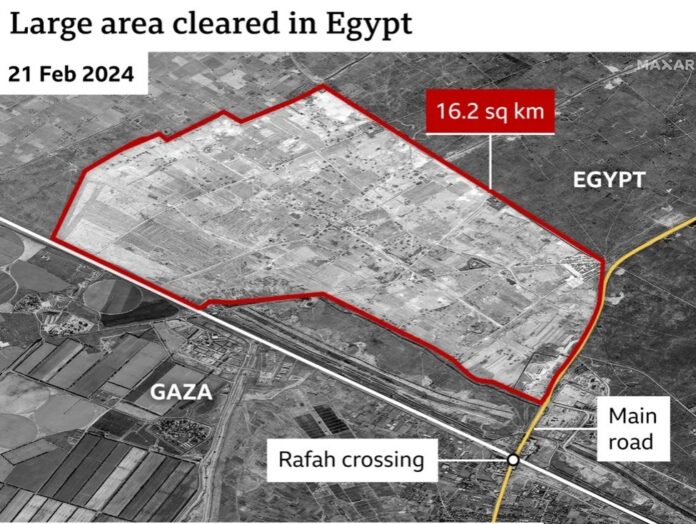Egypt has rapidly constructed over 3 kilometers of a wall along its border with Gaza within a week. The development comes in response to Israel’s warning of potential ground offensive preparations in Gaza’s southern city of Rafah.
Recent satellite imagery reveals the expansion of construction efforts, with more than 16 square kilometers cleared adjacent to the Gaza border, sparking speculation about the purpose behind these activities.
Egyptian authorities have adamantly refuted claims of providing provisions for displaced Palestinians, asserting that the cleared area is designated for a “logistical hub” to facilitate aid distribution.
Despite the visible construction of sections of the wall, Egypt maintains that the initiative is not intended to accommodate Palestinian refugees.
The clearing of this vast area commenced at the beginning of February, with significant acceleration observed over the past week. Satellite images depict simultaneous construction efforts at multiple sites, indicative of a swift and coordinated operation.
Reports initially suggested that the cleared area could potentially house Palestinian refugees, a claim promptly denied by Egyptian officials.
Egypt’s steadfast refusal to open its borders to refugees aligns with its long-standing stance, emphasizing economic and security concerns.
Israel, for its part, has categorically stated its disinterest in evacuating Palestinian civilians to Egypt, underscoring the complexities and sensitivities surrounding the Palestinian refugee crisis.
In response to mounting speculation, authorities in Egypt’s North Sinai province released a statement clarifying the purpose behind the construction, citing the establishment of a logistical area to streamline aid delivery to Gaza.
The move aims to alleviate congestion on roads near the border, which have witnessed increased activity amid ongoing tensions.
While Egypt’s actions ostensibly aim to address logistical challenges and reinforce security measures, the rapid construction of the wall underscores the delicate balance of power in the region.
Against the backdrop of escalating tensions between Israel and Hamas, each development assumes heightened significance, with potential implications for regional stability.
As the situation continues to evolve, observers remain vigilant, closely monitoring developments along the Egypt-Gaza border and the broader geopolitical dynamics shaping the Middle East.
In the face of uncertainty and escalating tensions, the construction of the wall serves as a stark reminder of the enduring complexities and geopolitical rivalries that define the region.
This article was created using automation technology and was thoroughly edited and fact-checked by one of our editorial staff members

